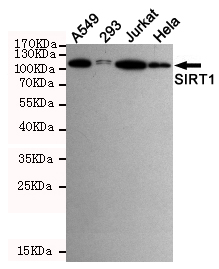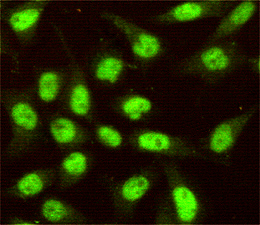-
Product Name
Anti-SIRT1 (1F3) Mouse antibody
- Documents
-
Description
SIRT1 (1F3) Mouse monoclonal antibody
-
Tested applications
WB, IHC-P, ICC/IF, FC
-
Species reactivity
Human
-
Isotype
Mouse IgG1
-
Preparation
Antigen: Purified recombinant fragment of human SIRT1 expressed in E. Coli.
-
Clonality
Monoclonal
-
Formulation
Ascitic fluid containing 0.03% sodium azide.
-
Storage instructions
Store at 4°C short term. Store at -20°C long term. Avoid freeze / thaw cycle.
-
Applications
WB: 1/500 - 1/2000
IHC: 1/200 - 1/1000
ICC: 1/200 - 1/1000
FC: 1/200 - 1/400
ELISA: 1/10000
-
Validations

Western blot detection of SIRT1 in A549,293,Jurkat and Hela cell lysates using SIRT1 mouse mAb (dilution 1:500).Predicted band size:120KDa.Observed band size:120KDa.

Immunocytochemistry of HeLa cells using SIRT1 mouse mAb (dilution 1:100).
-
Background
Swiss-Prot Acc.Q96EB6.The Sir2 protein in yeast is known to function in transcriptional silencing processes through the deacetylation of histones H3 and H4. The more recently described human homologue of Sir2, known as SIRT1, has been found to associate with the tumor suppressor protein p53.SIRT1 binds and deacetylates p53 with specificity for its C-terminal Lys382 residue in response to the upregulation of promyelocytic leukemia protein (PML) nuclear bodies or oncogenic Ras. The deacetylation of p53 SIRT1 has been shown to negatively regulate p53-mediated transcription, preventing cellular senescence and apoptosis induced by DNA damage and stress.SIRT1 has the closest homology to the yeast Sir2p and is widely expressed in fetal and adult tissues, with high expression in heart, brain and skeletal muscle and low expression in lung and placenta. SIRT1 regulates the p53-dependent DNA damage response pathway by binding to and deacetylating p53, specifically at Lysine 382.
Related Products / Services
Please note: All products are "FOR RESEARCH USE ONLY AND ARE NOT INTENDED FOR DIAGNOSTIC OR THERAPEUTIC USE"
